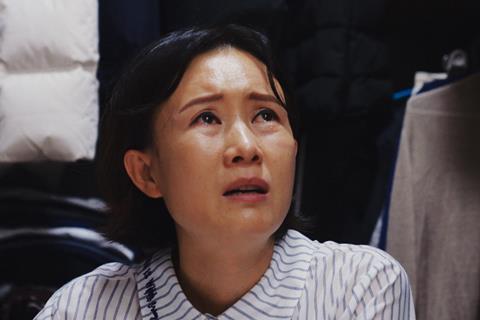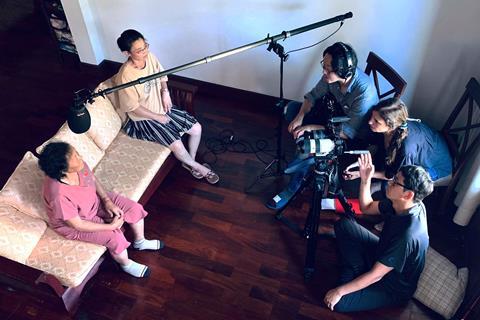Madeleine Gavin’s Beyond Utopia charts two attempts at defection from North Korea and the underground network that provides vital help.

Beyond Utopia was intended to be a very different film to the edge-of-your-seat experience that scooped the US documentary audience award at Sundance 2023.
Jana Edelbaum of New York production outfit iDeal Partners approached Madeleine Gavin to turn The Girl With Seven Names, a 2015 memoir by North Korean defector and activist Hyeonseo Lee, into a film. US director Gavin was initially hesitant and thought a Korean filmmaker would be more appropriate. She was also not interested in doing a biopic of Lee. But as she began to explore the idea, she could not turn down the offer.
“I dug deep into the dark web for months and I became obsessed,” says Gavin, who began her film career as an editor, with credits including US indie features Manic, Mean Creek and What Maisie Knew. “When I started to see the footage that was secretly filmed by North Koreans and saw the reality of their lives, I realised how much the rest of the world doesn’t see. I felt we had to do something present tense and up close and personal. I wanted to follow an escape.”
Meeting Seungeun Kim, a South Korean pastor who heads up one of the most active churches involved in helping defectors, was the key. “It took many months to get to know and trust each other,” says the director. “Pastor Kim is very protective of his network, but we [both] wanted to bring the outside world up close to North Koreans. We decided to follow the next two escapes he was going to help facilitate.”
The film interweaves these two escape stories with a portrait of Pastor Kim himself, who learned about the desperation of the North Korean population when he was working in China and has been helping defectors via the so-called underground railroad network for more than 20 years. One escape story follows the Roh family of five who cross the border into China and then, aided by Pastor Kim’s network of brokers and safe houses, travel through jungles and mountains down to Vietnam, Laos and finally to safety in Thailand. The second escape is told via Soyeon Lee, a defector and activist living in Seoul, who is trying to bring out the 17-year-old son she left behind as a small child a decade earlier.
Building the story
Two elements made this a very unusual experience for Gavin, whose feature debut as a director was the 2016 Netflix-backed documentary City Of Joy. “While we were shooting, we didn’t know how the story was going to end,” Gavin says. “We also didn’t know if the Roh family or Soyeon would give their consent. The Roh family were in extraordinary stress during the escape and you can’t ask anyone in those circumstances to consent because they didn’t even understand what it was they were giving consent to — they didn’t conceive of what a documentary was. We only got it after they had the resettlement training in South Korea. I’ve never been part of a movie where you’re shooting the whole movie and you don’t know if you can use any of it.”
Gavin faced a similar dilemma with Soyeon Lee’s story. “She knew she could say no at any point,” says the filmmaker. “We were filming with her right up to the final lock and we never knew if she would get some information about her son that would change her mind. This meant that I was editing two versions of the film, one with Soyeon and one without.”
Scattered throughout the almost unbearably tense segments charting the family’s perilous journey and Soyeon’s tearful conversations with her contacts in China and North Korea are spontaneous moments that lighten the mood: the Roh daughters nibbling hesitantly on chocolates, Pastor Kim finding his daughter’s homework among vital travel documents as he is talking to a broker.
One heartbreaking moment sees the Roh family’s grandmother crying as she talks about the “Great Leader Kim Jong-un” before realising the government has lied to her all her life.
“Mostly non-North Koreans meet defectors after they have gone through the assimilation process,” says Gavin. “One of the extraordinary things about this experience is that we met the Roh family so soon after they left North Korea, as they were first experiencing the outside world. Witnessing grandma grapple with what she has known to be true for 80 years vis-à-vis what she was experiencing in the present was remarkable.”

Grandma later says she wishes she had escaped years before and is kept awake at night thinking about the people she left behind. “It was important for me to end the film with our subjects talking about the people left behind because every defector I’ve met misses aspects of their homeland, in spite of wanting to leave,” says Gavin. “This is not a black-and-white situation and is full of nostalgia, guilt and loss. The people left behind are those who we all need to advocate for.”
Extra context
Gavin began filming in 2018 and continued, on and off, until late 2022. The thousands of hours included hidden filming from inside North Korea from a Japanese source and Pastor Kim’s network; footage filmed by brokers and the family using cameras Pastor Kim hides in China (neither he nor the film crew could enter the country); and film from the crew embedded with the family as they go through Vietnam, Laos and Thailand. Extra context is provided through studio interviews with historians, experts and other defectors including Hyeonseo Lee as well as newsreel and North Korea propaganda videos.
“I wanted audiences to be aware it was about escapes from a very specific place,” explains Gavin. “So we included information on, for example, how they have to collect their poop, or why the Bible is banned, or why they have to keep the portraits of the Kims in their houses clean. [It was a way] to ground us in their reality and to develop character.”
Gavin also uses animated sequences to illustrate aspects of life inside the state, for which there was no footage available. “I didn’t want recreations,” she says. “I wanted the animation to be as spare as it could be to create the wisp of a memory.”
Financing the film was, says Edelbaum, the “greatest challenge of my career”, partly because it was in Korean and partly because the subject matter “scared away many investors”. The producing and funding partners alongside iDeal comprise an array of companies, funds and foundations. Dogwoof took international distribution after Sundance and the film has sold to more than 20 territories with two streaming deals in the US (Hulu and ITVS/Independent Lens). It had a limited US and UK release via Roadside Attractions and Dogwoof respectively last autumn. The film went on to score four nominations at the Critics’ Choice Documentary Awards, and has made the Oscar shortlist and Bafta longlist for documentary.
Potential pushback was always on the filmmakers’ minds given how North Korea reacted to the release of Sony’s 2014 comedy The Interview. “We had consultants who alleviated some of our concerns,” Gavin says. “In The Interview, Kim Jong-un was mercilessly mocked and this was apparently untenable for him. What we say about him isn’t particularly irksome to him. Anxiety and fear definitely reared their heads throughout this process, [but] we had to push through our fears.”
The Roh family, Soyeon and Pastor Kim all attended the Sundance premiere. “It was extremely emotional for everyone,” Gavin says. “The family is thriving now. For Soyeon, things are very different. She and Pastor Kim have also been speaking out against the Chinese government’s policy of repatriation, as well as advocating for Soyeon’s son.”
Gavin is now working to complete a documentary she has been making on and off for the past few years. “It’s about a group of octogenarians in New York City who, while facing debilitating illnesses, are finding transcendence through their relationship with a charismatic, irascible, larger-than-life music coach. It’s a very different film but it is also visceral and experiential.”






![The Brightest SunScreen[Courtesy HKIFF]](https://d1nslcd7m2225b.cloudfront.net/Pictures/274x183/3/5/0/1448350_thebrightestsunscreencourtesyhkiff_312678.jpg)


















No comments yet